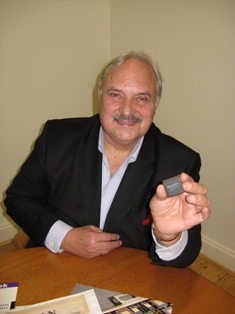
A virtual world party yesterday celebrated the founding 25 years ago of Austek Microsystems, the Adelaide-based company that showed Intel how to design faster performance computer chips.
Concurrent parties in Adelaide, Sydney, Melbourne, Bristol in England and San Jose in Silicon Valley commemorated the extraordinary legacy of Austek, a CSIRO offshoot company founded by Professor Craig Mudge in 1984 at Technology Park Adelaide.
As well as pioneering cache computing for personal computers, Austek trained more than 70 specialist engineers who have gone on to establish and lead other innovative technology companies.
Craig Mudge went on to develop the SA Government’s visionary IT 2000 program and lead the legendary Computer Science Lab at Xerox PARC (Palo Alto Research Centre) that created the next generation of internet protocols that contributed to the .COM boom.
Mudge has returned to live (almost full-time) in Adelaide.
“While Austek Microsystems no longer exists, it has spawned a group of engineers who have travelled the globe creating companies that are worth billions and employing thousands,” said Mudge.
“We are not celebrating ancient history, but the start of a story that is still unfolding through the brilliant young people we employed within Austek and how a great idea has raised 15 companies that are changing the world.
“We had a culture that created boldness and built confidence in people and part of that was always thinking internationally. They measured themselves internationally, not at Australian levels, and that part of the culture gave them the confidence to start new businesses and take on the world.
“We are also celebrating and acknowledging mentors at the CSIRO and elsewhere, as well as enthusiastic supporters like former Federal Science Minister Barry Jones and SA Premier John Bannon who were so excited by what this would do for industry and science.
“The global chip manufacturers were learning from us – we did the first cache and then Intel did it.
“What we showed to Intel was that it was possible to do it – that the customers wanted to be able to speed up their computers this way – the Dells, IBM saw that it was useful and then Intel decided to copy us.
“Things were very different in the 80’s, where state of the art knowledge of how to design caches was revealed in the literature we wrote and published - and other people learned,” said Professor Mudge.
Austek however was unable to compete with Intel in the rapidly expanding cache controller market. The Adelaide design office closed in 1992, and the company was wound up in 1994.
The ground breaking signal-processing research and design that began with Austek has enabled the development of MP3 players, the iPods, submarine hunting sonar, CAT scanners and radio telescopes looking for new heavenly objects that are light years away.
Background: Dr Craig Mudge BEc PhD FTSE: Former director of the Computer Science Lab at Xerox PARC, CSIRO chief research scientist, computer designer at HP/DEC, and experienced Silicon Valley entrepreneur, has worked in the computer industry in the US, Asia, Australia, and Europe.
He taught computer science and engineering at Caltech, Carnegie Mellon and Flinders universities and founded Austek Microsystems based on a breakthrough chip-design technology developed in his group, the VLSI Program, at CSIRO.
He has six patents in computer design. His commitment to leadership in the management of innovation led to his founding the Macquarie Institute for Innovation as Professor of Innovation at Macquarie University. In 2001 he was awarded a Centenary Medal for service to Australian society in microelectronics and telecommunications.
Mudge currently is Managing Partner of Pacific Challenge, a strategy and innovation consultancy in its tenth year, sharing his time between Silicon Valley and Australia.
As director of the legendary Computer Science Lab at Xerox PARC in the nineties, Mudge nurtured the next generation Internet Protocol, built a management team to take responsibility for commercial results, and launched several Internet businesses, one of which, Placeware, was acquired by Microsoft and another resulted in a three hundred million dollar licensing contract.
Currently, his main service appointment is Chair, Working Group on Cloud Computing at Peta-scale in the Australian Academy of Technological Sciences and Engineering.
Related News
- River Time spells success for Alphabette Adelaide retro-pop band Alphabette has scored a major success with its recently released song ‘Pitstop’ chosen as the musical track to the SA Government’s new Riverland TV commerci...
- Raaj shows moxie with new tech business Veteran technology entrepreneur Raaj Menon has launched Moxitech, a startup software firm that aims to deliver the benefits of the connected world to even the smallest business. D...
- Australian organic producers see a ‘global first’ China trade pact to deliver $100m boost A world first Australia-China organic trade access agreement is predicted to boost Australia's organic and biodynamic industry by up to $100 million per year. Australia’s premier ...
- Lovely Louise aims to come up roses Irish-born South Australian Louise Thompson may have to kiss the blarney stone if she achieves her goal of becoming SA’s Rose of Tralee on June 1. Louise moved to Adelaide two yea...





